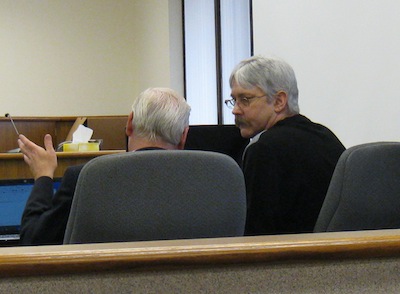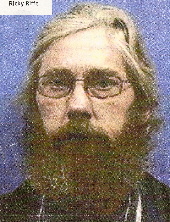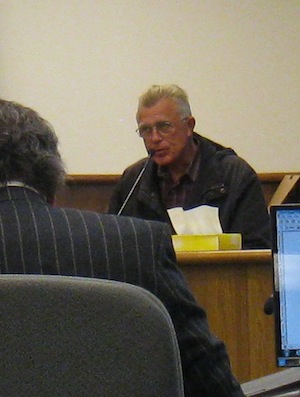Updated at 8:05 p.m.
By Sharyn L. Decker
Lewis County Sirens news reporter
CHEHALIS – Ricky Riffe may or may not testify in his murder trial but this week, jurors heard second-hand some of the things he’s said when questioned by investigators.
Jurors have already heard the case went cold until 1991 the year detectives reached out to Robin Riffe, his wife.
Former Lewis County Sheriff’s Office Sgt. Glade Austin came back to the witness stand to talk about a trip he and three others made to Alaska in 1992 to talk with the former Mossyrock area brothers.
Riffe, 55, is charged in the December 1985 deaths of Ethel residents Ed and Minnie Maurin. Prosecutors contend he and his now-deceased younger brother are responsible for abducting the elderly couple and forcing them to withdraw money from their bank before they were shot in their backs with a shotgun.
The trial in Lewis County Superior Court in Chehalis began early last month; closing arguments aren’t expected for another two weeks.
Austin testified it was February 1992 when he and Deputy Joe Doench visited Riffe at his home in King Salmon, Alaska.
They picked him up at his residence, where he lived with Sherry Tibbetts, and took him to the police department. He went voluntarily, Austin said.
Riffe told them he’d come to Alaska a couple of years before to work, and that he had wanted to get away from a life in Lewis County that sucked, and didn’t want to do drugs anymore, according to Austin.
He confirmed he’d cut off a shotgun for his friend Les George, Austin testified. He confirmed he had a green Army jacket, he said.
When asked about Dec. 19, 1985, Riffe said he no way of recalling what he was doing back then, he said.
He replied: “No, I can’t tell you. Jesus Christ, that was years ago,” Austin recounted.
The former sheriff’s sergeant described the suspect’s demeanor as emotionless. An Alaska state trooper who accompanied them testified previously that the suspect seemed “forcibly relaxed”, although at one point when left alone in the interview room, was observed through the one-way glass and was pacing.
The interview ended with Riffe finally saying he should talk with an attorney, according to Austin.
During the same trip, two others from the sheriff’s office went to see the brother John Gregory Riffe in Ketchikan.
Ted Bachman, then an Alaska state trooper who was present, testified he thought the younger Riffe initially showed a lack of curiosity about why they were there.
“Was he asked if he killed the Maurins?” Lewis County Prosecutor Jonathan Meyer asked.
“I think he said I don’t know, no, I just can’t remember, I need to think,” Bachman said.
“At some point did Greg start crying?” Meyer asked
“Oh yes,” Bachman said.
The brothers were not arrested.
A private detective hired by the victims’ family took the witness stand yesterday and spoke about last year’s arrest in Alaska, as well as some of what led up to it.
Chris Peterson who retired from the sheriff’s office in Portland, was connected up with Minnie Maurin’s son Denny Hadaller about 10 years ago. Lewis County Undersheriff Gordon Spanski introduced them, he said.
“Denny was interested in finding out who murdered his mother and step-father,” Peterson said. “I think he was hopeful a fresh look might be helpful.”
Peterson said he and another private investigator – Jim McNelly, his former partner in law enforcement – reviewed the sheriff’s office case files and found areas they felt should be revisited. They did that, conducting numerous interviews, according to Peterson.
They put advertisements offering a $10,000 reward for information in newspapers in Lewis County and in Alaska, he said. The Riffes were the primary suspects, according to Peterson.
The two men were pretty active on the case for about five years, he said. They continued to assist sheriff’s detective Bruce Kimsey, with Peterson joining him when Rick Riffe was arrested last year.
They traveled to Alaska in July and went to Riffe’s house in King Salmon. John Gregory Riffe had recently died.
Riffe wouldn’t go to the police station with them, so the interview of approximately two hours took place at his home, according to Peterson.
“It was all very friendly,” he said. “I could see no outward animosity. No unpleasantness took place.”
Most of the interview was done by Kimsey, but Peterson had some of his own questions, he said.
According to Peterson, Riffe confirmed he’d gone to White Pass with his wife in December 1985 to buy two ounces of cocaine from a person named Vickers, but said it was mostly her deal.
He didn’t recall his wife buying a pound of marijuana from Dora Flynn, and said he didn’t recall a phone call to his wife from his friend Les George during that time period, according to Peterson.
The private investigator’s testimony was interrupted briefly when defense attorney John Crowley said he never received during the discovery process the report the witness was looking at.
Lewis County Senior Deputy Prosecutor Will Halstead asked Peterson about Riffe’s demeanor.
“Very nonchalant,” he said. “He didn’t seem particularly bothered by our presence.”
And what about when he was told he was under arrest, Peterson was asked.
“Virtually no reaction, he didn’t seem surprised,” he replied.
The trial will be in recess until 1:30 p.m. on Tuesday, as Riffe’s lawyer has to be in federal court in Yakima on Monday.
Numerous other witnesses testified this week and prosecutors have more lined up they say could last until next Friday. After that, Crowley has about three days of defense witnesses.
Below is some of the other testimony jurors heard this week:
From Tuesday, Oct. 29, 2013
Jeff McKenzie lived in Toledo back in 1985, and drove truck for M and M Transport.
When what happened to the Maurins hit the news, the widely publicized composite drawing of a person police were looking for reminded him of an odd encounter on Dec. 19, 1985, according to McKenzie.
“I seen that sketch and I told my wife, this is the person that tried to get me to give him a ride to Ethel the other night,” McKenzie testified.
According to McKenzie, he picked up a load at Cascade Hardwood in Chehalis and was destined for Camas but stopped at the AM/PM on Interstate Avenue at 13th Street to get something to drink. It was right after dark, at 6, 7, or 8 o’clock at night, he said.
He parked on the shoulder and began to cross the street when a guy approached him from behind, yelling that he wanted a ride. He was very persistent and wouldn’t take no for an answer, according to McKenzie.
The man was scruffy, his eyes were dilated and he seemed to be on something, McKenzie testified. In his arms, he was cradling something in a crumpled up brown paper grocery bag, he said.
The man looked behind McKenzie, who turned to see a police car and when he turned back, the guy had bolted, right across the trailer hitch on his truck.
He described the man as wearing a green fatigue jacket and a knitted cap that had a white stripe and may have been medium blue.
McKenzie didn’t hear from police again until September of last year when he met with detective Kimsey and picked out photos of two individuals. His first choice was Rick Riffe; his second choice was John Gregory Riffe.
From Tuesday, Oct. 29, 2013
Linda and Richard Zandecki took the witness stand this week as well.
She was asked about a time she found a shotgun in the bedroom closet of their home, in the room her son Les George stayed in when he was in town.
It was a shotgun that was altered and she knew it was illegal, she said. Linda Zandecki testified it worried her to have it in the house with her younger son.
“I called Les, he was on the road, and I told him I didn’t want it there,” she said. “Les said, tell Dick to do something with it.”
She knew her husband got rid of the gun, but didn’t know where it went until much later, Linda Zandecki testified.
She was friends with the Maurins, from being members of the Grange. Her husband worked for Denny Hadaller, driving a truck.
Richard Zandecki described it as a sawed off shotgun, about 24 inches long.
He said he took it with him one morning and on the way to work as he headed west across Lake Mayfield, he pulled over to the left lane and tossed it out the window of his pickup truck, he testified.
He couldn’t recall how long after it turned up he disposed of it, he said. It was a few days, or a week, he said.
“We didn’t want it around,” he said. “It was an illegal gun and I just wasn’t interested in it.”
Richard Zandecki didn’t tell anyone, including his son, what he did with the gun, he testified.
Divers have searched the lake twice, once as recently as September of last year but have not found the gun.
From Wednesday Oct. 30, 2013
Cathy Thola said she never heard about the Maurin homicides until 2004 when an investigator came to her house in Enumclaw and asked her about her relationship with Ricky Riffe.
She said she was raised in Morton, but went to high school in Enumclaw and moved to Mossyrock in 1986 with her two young children to stay with her aunt and uncle. She moved there from Randle, she thought.
Riffe was their friend, he was no longer with his wife and the two began dating, soon moving into a red house on Damron Road, according to Thola.
The only drug she knew her boyfriend to use was pot, she said. He typically dressed in jeans, T-shirts, a heavy Army jacket and a baseball cap, according to Thola.
Riffe and his younger brother were really close, she said.
“They did everything together, they ran around together,” she said. “They were inseparable.”
She and Riffe argued quite a bit, she testified. On the witness stand, she was asked to recount an incident at their house when the two were yelling at each other, she wanted to split up and Greg Riffe got involved.
“He looked at me, he looked at Rick and said, ‘we’ve killed one person, we can do it again’,” Thola testified.
Thola’s then-5-year-old daughter took the witness stand as well and the two described Rick Riffe as responding as though in agreement, with a slight nod and small smile or snicker.
Riffe threw a pot of beans from the stove against the wall as she began to leave, according to Thola.
They didn’t break up, the family moved to Shelton and then in 1987 or 1988 Thola took her children to Ketchikan to live with Riffe, jurors heard.
“To try to get a new life, because we weren’t doing well,” she said. “Because he had an uncle there who offered him a job.”
She collected welfare and worked at a Jimbos cafe; they lived in a small studio behind the restaurant, according to Thola.
Thola said she didn’t see Greg Riffe while she was in Alaska and didn’t think she was there even a year, but couldn’t recall for sure.
Under questioning by defense attorney Crowley, Thola said there was no urgency about the relocation; she also said she didn’t know her boyfriend was from Alaska.
When she and her children got on a ferry boat to come back to Washington, Riffe got on the ferry and followed her, she testified.



 Join us
Join us